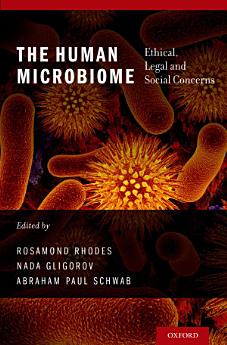The Human Microbiome: Ethical, Legal and Social Concerns
Rosamond Rhodes · Nada Gligorov · Abraham Paul Schwab
Aug 2013 · Oxford University Press
Ebook
288
Pages
family_home
Eligible
info
reportRatings and reviews aren’t verified Learn More
About this ebook
The human microbiome is the bacteria, viruses, and fungi that cover our skin, line our intestines, and flourish in our body cavities. Work on the human microbiome is new, but it is quickly becoming a leading area of biomedical research. What scientists are learning about humans and our microbiomes could change medical practice by introducing new treatment modalities. This new knowledge redefines us as superorganisms comprised of the human body and the collection of microbes that inhabit it and reveals how much we are a part of our environment. The understanding that microbes are not only beneficial but sometimes necessary for survival recasts our interaction with microbes from adversarial to neighborly. This volume explores some of the science that makes human microbiome research possible. It then considers ethical, legal, and social concerns raised by microbiome research. Chapters explore issues related to personal identity, property rights, and privacy. The authors reflect on how human microbiome research challenges reigning views on public health and research ethics. They also address the need for thoughtful policies and procedures to guide the use of the biobanked human samples required for advancing this new domain of research. In the course of these explorations, they introduce examples from the history of biomedical science and recent legal cases that shed light on the issues and inform the policy recommendations they offer at the end of each topic's discussion. This volume is the product of an NIH Human Microbiome Project grant. It represents three years of conversations focused on consensus formation by the twenty-seven members of the interdisciplinary Microbiome Working Group. "The microbiome is a relatively new area of medical attention. Ethical issues related to the microbiome have barely been identified, much less carefully analyzed. This volume is an excellent start toward that ethical analysis. Many of the arguments are persuasive and provocative. In particular, some contributors challenge the ethical need for anonymizing microbiome specimens as well as the need for individual informed consent for specific uses of these specimens. I highly recommend this volume for all those interested in the microbiome and in new frontiers in medical ethics." -Leonard M. Fleck, Michigan State University
About the author
Rosamond Rhodes, Ph.D., is Professor of Medical Education and Director of Bioethics Education at Icahn School of Medicine at Mount Sinai, Professor of Philosophy at The Graduate Center, CUNY, and Professor of Bioethics and Associate Director of the Union-Mount Sinai Bioethics Program. She writes on a broad array of issues in bioethics. Nada Gligorov, Ph.D., is Assistant Professor of Medical Education at Icahn School of Medicine at Mount Sinai and Assistant Professor of Bioethics at the Union- Mount Sinai Bioethics Program. She is primarily interested in neuroethics, most specifically determinism and free will as well as the impact of brain imaging technologies on privacy. She has also published on personal identity as it relates to biomedical issues such as advance directives. Abraham Paul Schwab, Ph.D., is Assistant Professor of Philosophy at Indiana University-Purdue University Fort Wayne and an associate faculty member in the Union-Mount Sinai Bioethics Program.
Rate this ebook
Tell us what you think.
Reading information
Smartphones and tablets
Install the Google Play Books app for Android and iPad/iPhone. It syncs automatically with your account and allows you to read online or offline wherever you are.
Laptops and computers
You can listen to audiobooks purchased on Google Play using your computer's web browser.
eReaders and other devices
To read on e-ink devices like Kobo eReaders, you'll need to download a file and transfer it to your device. Follow the detailed Help Center instructions to transfer the files to supported eReaders.







